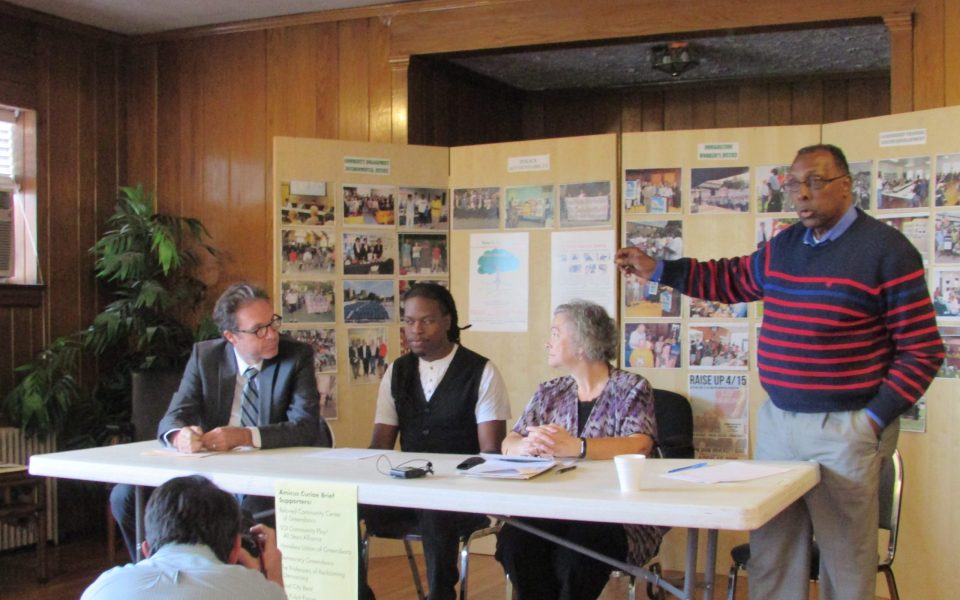A group of Greensboro police officers involved in a 2016 encounter in downtown Greensboro with a group of young, Black men have filed notice to withdraw their participation from litigation pending before the state Supreme Court, a hearing to determine the constitutionality of a gag order filed by a Guilford County judge.
Without mentioning the officers by name, the notice filed today by Greensboro lawyer Gavin Reardon gives “advance notice to the court of their intention not to participate in the present appeal.” The notice said the officers are opposed to the council members being restrained from speaking about the video only if it is not released to the public.
During the September 2016 encounter, officers arrested four men, Tase-ing one in the process. A bystander recorded video of the incident that was posted on YouTube. One of the men, Zared Jones, filed a complaint against Sgt. Steven Kory Flowers, Cpl. Korey R. Johnson and Officer Samuel Alvarez. All charges were eventually dropped against the four young men, while the police department cleared the officers of wrongdoing.
Jones appealed the police department’s decision to the Greensboro Police Community Review Board. The review board and the city petitioned Guilford County Superior Court to release the police body-camera video. Judge Susan Bray ordered that the video be released to city council members, the city manager and legal counsel while imposing a gag order preventing them from disclosing or discussing the video with the public. In 2019, the state Court of Appeals upheld the gag order. Earlier this month, the state Supreme Court agreed to hear an appeal on constitutional grounds.
Reardon’s filing goes on to say: “The involved officers recognize the significance of constitutional challenges, and that the court would likely prefer to have both sides of the argument represented. However, they are seeking no action from this court and are expressly unwilling to argue the constitutionality of the statute or the ‘gag order.’ Accordingly, the involved officers do not intend to participate in this appeal. They are, therefore, providing this notice of noninvolvement to the court in case the court would desire to designate a court-appointed amicus for the statute and/or order.”
Reardon told Triad City Beat that Senate President Pro Tem Phil Berger and House Speaker Tim Moore would likely have the right to join the suit to defend the statute, “or the court itself could appoint an attorney to act as an ‘amicus,’” although it’s uncommon.
In appealing the decision, the city of Greensboro argued that the Court of Appeals “made this ruling virtually without First Amendment analysis.” The city said the gag order and Court of Appeals ruling “raise serious constitutional questions and trigger the statutory grounds for discretionary review. As the only appellate opinion examining the new statutory scheme regulating such hot-button issues, the decision of the Court of Appeals will have widespread and weighty consequences.”
The Lawyers’ Committee for Civil Rights Under Law, the ACLU of North Carolina and the city of Durham filed an amicus brief in support of the city of Greensboro’s appeal, arguing that the gag order subverts the right to self-governance. The amicus brief also charges that the order undermines “the people’s ability to fulfill their foundational civic duty to be informed and engaged on important issues impacting the community, which is necessary to ensure that their elected government officials are effectively representing their interests.”
TCB and the Carolina Peacemaker joined roughly a dozen community organizations that signed on to the amicus brief, including the League of Women Voters of the Piedmont Triad, transparency advocate Roch Smith Jr., the Homeless Union of Greensboro and the Pulpit Forum.
Reardon said the officers are opposed to council members speaking publicly about the recordings only if they are notalso released to the public.
“The officers believe that the recordings would show they did nothing wrong, which is what the Police Community Review Board decided when they saw them,” Reardon said. “So the officers are not opposed to the recordings being publicly released. They’re also not opposed to council members viewing the tapes and then publicly speaking about them. But the officers are very much opposed to the possibility of city council members being able to view the recordings in private and to then editorialize about them in public without releasing the recordings to the public.”
Patrick Kane, the lawyer representing the city of Greensboro, could not be reached for comment.
Mark Dorosin, the lead attorney for the amicus groups, said the officers’ withdrawal only strengthens the city’s case.
“The decision by the GPD officers to no longer participate in this appeal makes the issue before the court even more plain: whether a single superior court judge has unfettered discretion to restrict the fundamental constitutional right of the people to hold their elected officials accountable by preventing those officials from speaking about matters of vital public concern — in this case, police misconduct and violence against people of color.”
Join the First Amendment Society, a membership that goes directly to funding TCB‘s newsroom.
We believe that reporting can save the world.
The TCB First Amendment Society recognizes the vital role of a free, unfettered press with a bundling of local experiences designed to build community, and unique engagements with our newsroom that will help you understand, and shape, local journalism’s critical role in uplifting the people in our cities.
All revenue goes directly into the newsroom as reporters’ salaries and freelance commissions.





Leave a Reply